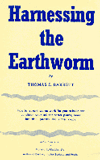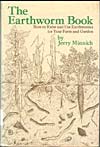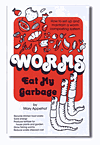
![]()
Search the Journey to Forever website – click HERE
|
Journey to Forever: Make a donation |
Navigation
| Small farms library | |
| City farms | |
| Organic gardening | |
| Composting | |
| Introduction Compost and organics What is compost? |
|
| Making compost | |
| Good compost How not to fail Greens and browns Hints Compost containers Assembling the materials Adding liquids Batches Animal manure Sifting Cold weather |
|
| Composting resources | |
| Virtual composting Core texts General composting |
|
| Composting indoors | |
| Think small Filling the bin Problems Think even smaller Resources |
|
| Vermicomposting | |
| Vermicompost and plants The worms Breeding Worm boxes Dimensions Bedding Feeding Harvesting Problems Garden wastes Using vermicompost |
|
| Vermicomposting resources | |
| Humanure | |
| Foundation work Modern developments Best of all! |
|
| Composting for small farms | |
| Foundation work On-farm composting resources |
|
| Small farms | |
Contact usTo Keith Addison Handmade Projects |
Vermicomposting resources
Books
"The Formation of Vegetable Mould through the Action of Worms with Observations on their Habits" by Charles Darwin, John Murray, London, 1881; Faber and Faber, London, 1945, with an Introduction by Sir Albert Howard; 1976, ISBN 0916302067 Worm Digest -- Quarterly magazine, online articles, worm forum, back issues, all about worms and vermicomposting.
A classic of ecology. "All the fertile areas of this planet have at least once passed through the bodies of earthworms." Darwin had a much higher opinion of this book than of his "Origin of Species", which he had to be persuaded to write. He experimented with worms for more than 40 years.
This is one of his conclusions, following a most elegant series of experiments: "One alternative alone is left, namely, that worms, although standing low in the scale of organization, possess some degree of intelligence." Darwin proved that worms make intelligent choices! This book is a rare delight.

Earthworms are slowly burying Stonehenge, says Darwin: Section through a fallen Druidical stone, showing how much it had sunk (nearly 12")
Full text free online at the Small Farms Library.
Buy at Amazon.com: The Formation of Vegetable Mould
"Friend Earthworm: Practical Application of a Lifetime Study of Habits of the Most Important Animal in the World" by George Sheffield Oliver, 1941 -- one of the all-time classics on the earthworm. Dr Oliver was one of the first to harness the earthworm to the needs of the farmer and gardener, making highly fertile topsoil for optimum crop growth, and producing a constant supply of cheap, high-grade, live protein to feed poultry. He devised simple yet elegant and effective systems to bring costs and labour down and productivity up to help struggling farmers make ends meet. Oliver had an observant and critical eye and understood Nature's round. His ideas on the nature of modern food and health (or the lack of it) are only now being confirmed, half a century later. A delightful book. Full text online at the Journey to Forever Small Farms Library. Plus "My Grandfather's Earthworm Farm", "Eve Balfour on Earthworms", "Albert Howard on Earthworms", "The Housefly" by Roy Hartenstein.
 "Harnessing the Earthworm" by Dr. Thomas J. Barrett, Humphries, 1947, with an Introduction by Eve Balfour; Wedgewood Press, Boston, 1959; Bookworm Pub Co, ISBN 0916302091
"Harnessing the Earthworm" by Dr. Thomas J. Barrett, Humphries, 1947, with an Introduction by Eve Balfour; Wedgewood Press, Boston, 1959; Bookworm Pub Co, ISBN 0916302091
"A practical inquiry into soil building, soil conditions, and plant nutrition through the action of earthworms, with instruction for the intensive propagation and use of domesticated earthworms in biological soil building." Well-researched, well-written, pioneering book on vermicomposting, very positive outlook, a refreshing read. Includes Dr George Sheffield Oliver's famous story "My Grandfather's Earthworm Farm" -- inspiring! Facts, figures and illustrations, details of Barrett's Earthmaster Culture Bed. Buy at Amazon.com: Harnessing the Earthworm
 "The Earthworm Book: How to Raise and Use Earthworms for Your Farm and Garden" by Jerry Minnich, Rodale Press, Emmaus, 1977, ISBN 0878571930
"The Earthworm Book: How to Raise and Use Earthworms for Your Farm and Garden" by Jerry Minnich, Rodale Press, Emmaus, 1977, ISBN 0878571930
Hard to find -- this is Rodale's worm encyclopaedia, a thorough survey of the subject. Buy at Amazon.com: Rodale's Earthworm Book
 "Worms Eat My Garbage" by Mary Appelhof, Flower Press, Kalamazoo, Michigan, 1982
"Worms Eat My Garbage" by Mary Appelhof, Flower Press, Kalamazoo, Michigan, 1982
A quick, easy read, simple and positive guide to vermicomposting by biologist Mary Appelhof, aka "Worm Woman", who fed her garbage to worms for more than 25 years. The most popular worms book -- more than 165,000 copies sold. Buy at Amazon.com: Worms Eat My Garbage
"Biology and Ecology of Earthworms" by C.A. Edwards and P.J. Bohlen, Chapman & Hall, 1996, ISBN 0412561603, 440 pages
The third edition of this basic textbook on earthworms reviews all aspects of earthworm biology and ecology; updated throughout with extensive additions. Expanded treatment of earthworm community ecology, interactions between earthworms and micro-organisms, and the importance of earthworms in environmental management and their use in organic waste management. 70-page bibliography. Comprehensive. Buy at Amazon.com: Biology and Ecology of Earthworms
Online resources
http://www.wormdigest.org/
The Earthworm FAQ at Howtocompost.org (formerly the Compost Resource Page), focus on vermicomposting household kitchen wastes, 1,400 words, clear and concise (reprinted from Green Hut):
http://www.howtocompost.org/info/info_wormfaq.asp
Lots of useful and interesting stuff about worms at The Burrow.
http://www.jetcompost.com/burrow/index.html
Good information on bedding -- everything you need to know here: Introduction, Peat Moss, Bog Soil, Newsprint, Machine-Shredded Paper, Cardboard (cardboard is his favourite):
http://www.jetcompost.com/burrow/1bedding.htm
Composting With Red Wiggler Worms -- Good basic guide to worm composting, by Gillian Elcock and Josie Martens, City Farmer, Canada's Office of Urban Agriculture: Why Compost? and Why Compost With Worms?, Getting started, what you need, bedding, worms, feeding, location, maintenance, problems and solutions, useful links.
http://www.cityfarmer.org/wormcomp61.html#wormcompost
Composting with Redworms, by Joyce Jimerson, Master Composter/Recycler Program Manager at Washington State University. The solution for apartment dwellers with no space for a compost pile. "Kitchen wastes can be converted to a rich humus with the help of redworms. Children find worms fascinating. They are very well behaved 'pets,' and also help with household chores!" Small-space worm composting in a nutshell.
http://whatcom.wsu.edu/ag/compost/Redwormsedit.htm
Cheap and easy worm bin -- simple system for indoors, using two plastic storage boxes. Instructions and photographs, from Cooperative Extension, Washington State University.
http://whatcom.wsu.edu/ag/compost/Easywormbin.htm
City farms
Organic gardening
Building a square foot garden
Plant spacing guides
No ground? Use containers
When to sow what
Seeds
Garden pond
Gardening resources
Composting
Making compost
Composting resources
Composting indoors
Vermicomposting
Humanure
Composting for small farms
Small farms
Small farm resources
Community-supported farms
Farming with trees
Farming with animals
Pasture
Pigs for small farms
Poultry for small farms
Aquaculture for small farms
Composting for small farms
Controlling weeds and pests
Small farms library